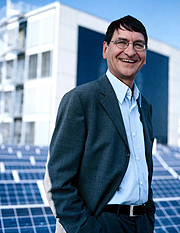Reiner Lemoine Institut

About us
The Reiner Lemoine Institute is an independent non-profit research institution that contributes to a transformation towards a sustainable energy supply based on 100 % renewable energy. For more than ten years we have conducted applied research to scientifically support the long-term transition of the energy supply system towards renewable energy. Open source models developed here have firmly established themselves in energy system modeling. Our mobility and electrification concepts have been implemented by private companies as well as the public sector worldwide.
Organizational Chart Reiner Lemoine Institut (RLI)
Our scientific research is conducted in three interconnected research units:
The research unit Transformation of Energy Systems develops, investigates, and optimizes future scenarios for a sustainable energy supply. For this, self-developed open source tools are mostly used. Among others these include dialogue and visualization tools for the energy transition
The research unit Mobility with Renewable Energy conducts research at the interface between sustainable drive systems and renewable power generation. As a contribution to the energy transition in the transport sector, we examine how alternatives to gasoline and diesel engines can be incorporated in renewable energy systems in an economically and ecologically reasonable manner and what charging infrastructure will be needed in the future.
The Off-Grid Systems research unit develops electrification strategies based on renewable energy for developing regions and optimizes hybrid mini-grids with the help of simulation models and geographic information software. By this we especially support the UN Sustainable Development Goal for affordable and clean energy (SDG7) as well as climate action (SDG13).
Guiding Principles
We are committed to the philosophy of our founder Reiner Lemoine. His vision was of a livable future for all people, and with our work we aim to contribute to a successful Energy Transition. The Energy Transition shall be shaped and funded through the participation of all citizens and thus contribute to a fairer society. Our research results and findings are validated under real-world conditions wherever possible and made available to the public. We work self-critically, transparently, and are committed to scientific research ethics. In our research practice, participatory collaboration and a trustful and respectful work environment is important to us.
We are particularly pleased that in addition to our research we were able to create a positive work environment at the Reiner Lemoine Institute. Men and women work together as equals on all hierarchical levels and many decisions are made collectively. We work for the energy transition with scientific methods – but also out of personal conviction.
We have summarized our values and goals in a policy document
Funding
The RLI is financially supported by the Reiner Lemoine Foundation, though we raise 90 percent of our research funding from external sources. These consist largely of public funding from the federal state, national, and European level as well as research contracts and consulting in the public sector, non-governmental organizations, and the private sector.
As a non-profit organization, we are also eligible for donations according to German tax law.
As of Jan. 1, 2021, RLI is also recognized in the United States of America as a non-profit, non-governmental organization and is therefore eligible to accept grants from American donors.
History
The Reiner Lemoine Institute was founded in February 2010 by the Reiner Lemoine Foundation as a wholly-owned subsidiary and started its work in April 2010. The founding managing directors of the institute were Jochen Twele and Peter Kayser, two professors at the Hochschule für Technik und Wirtschaft Berlin (HTW Berlin). The institute was built in close proximity to the HTW at its Oberschöneweide location. In 2017 the RLI moved to the Berlin Adlershof Science and Technology Park.
The institute, which initially consisted of two managing directors and four employees, has grown steadily with an increasing number of research projects and today employs more than 70 people. The institute has been headed by Kathrin Goldammer since February 2016.
Reiner Lemoine
Reiner Lemoine was born in 1949 in Berlin. He studied aerospace engineering and graduated from the Technical University of Berlin in 1979. Reiner Lemoine is considered as one of the main pioneers in the field of renewable energy in Germany. Together with friends and business partners, he founded a number of innovative companies, such as Wuseltronik GbR, an engineering office for measuring technologies and renewable energy technology in 1978, the Solon AG in 1996, and Q-Cells AG, a developer and manufacturer of high-performance solar cells in 1999.
As a visionary and advocate of the Energy Transition, Reiner Lemoine contributed with perseverance and exceptional willingness to take risks to the establishment of renewable sources of energy in our society, transforming these from a “niche” technology into a rapidly growing industry with world-wide renown for the long-term economic and developmental benefit of humanity. Although Reiner Lemoine focused on technical aspects of renewable energy, he kept social and political aspects in mind: Renewable energy strengthens the independence of nations, reduces conflicts over fossil fuels, secures the livelihood of millions of people and protects the environment. His commitment was deeply ethically motivated. This is illustrated in the way he managed his companies: For example, he founded the Wuseltronik GbR as a "collective" with equal remuneration for all employees and joint decision-making. Even in later and larger companies, a positive work environment for all employees was one of his priorities.
After Reiner Lemoine passed away in 2006, the Reiner Lemoine Foundation continues the legacy of its namesake and founded the Reiner Lemoine Institute in 2006.
More on Reiner Lemoine on the website of the Reiner Lemoine Foundation.





